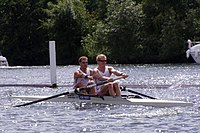Head of the Schuylkill Regatta
| HOSR | |
|---|---|
The Head of the Schuylkill Regatta | |
| Date | Last weekend of October |
| Location | Philadelphia |
| Event type | Head Race |
| Distance | 2.5 miles (4.0 km) |
| Established | 1874[1] |
| Organizer | University Barge Club |
| Official site | www.hosr.org |
| Participants | 8,000 entries; 272 clubs[2] |

The Thomas Eakins Head of the Schuylkill Regatta (also known as the HOSR or the HOS) is a rowing race held annually during the last weekend in October on the Schuylkill River in Philadelphia, Pennsylvania.[3] The HOSR is the final race in the Fall Fury series, which includes the Head of the Ohio and the Head of the Connecticut.[4] Along with the Head of the Charles and the Head of the Connecticut, the HOSR is considered one of the three “fall classics.”[5] The HOSR is one of the marquee races in the Philadelphia Classic Regatta Series, which also includes the Stotesbury Cup Regatta, the Philadelphia Scholastic Rowing Championship, the Schuylkill Navy Regatta, and the Independence Day Regatta.[6]
Regattas such as the Head of the Charles in Boston and the Head of the Schuylkill in Philadelphia are to the rowing world what the New York Marathon and the Boston Marathon are to running.
— Susan Saint Sing, The Eight: A Season in the Tradition of Harvard Crew[7]
History
[edit]
The HOSR was first held in 1874.[1] The regatta, as it exists now, was founded in 1971 by members of the University Barge Club, Joseph N. “J” Pattison IV and Olympic Rower, Lyman S.A. Perry.[8][9]
Until recently, the event was the largest one-day rowing competition in the world. The HOSR became a two-day event in 2008.[10] It is the largest regatta in Philadelphia.[11] As of 2003, the HOSR was America's second largest regatta.[12]
Format and course
[edit]The HOSR is a head race, which is a time-trial competition where boats race in close succession from a rolling start. The rower or crew completing the course in the shortest time in their age, ability and boat-class category is deemed the winner.
The course stretches 2.5 miles (4.0 km) from the start to the finish at Boathouse Row and contains four bridges in total, which appear in this order from the start:
The Columbia Railroad Bridge is the most difficult part of the course because coxswains must make a sharp turn of nearly ninety degrees.[13]
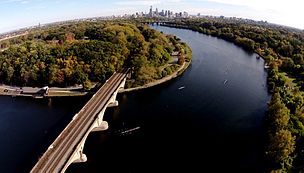
Coming under the Columbia bridge is like the Weeks [Memorial Bridge] turn at the Charles. You want to be already turning before you get out of the bridge.
There is a dangerous waterfall less than 300 meters from the finish line across from Boathouse Row.[14] The 13-foot Fairmount Water Works Dam stretches 400 meters across the Schuylkill.[14]
The dam is difficult for coxswains to see because it is so wide.[14] A rowing shell caught broadside beyond the safety cable would easily be swept over the falls.[14]
Competitors
[edit]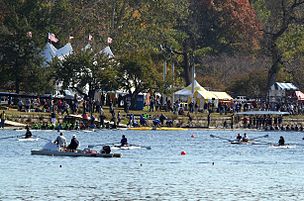
The regatta draws competitors from across the United States and internationally. Competing teams regularly hail from countries including:
| Australia[15] | Canada[15] | France[15] | Germany[16] |
| Great Britain[15] | Greece[15] | Guatemala[15] | Hong Kong[17] |
| Ireland[18] | Mexico[16] | Peru[16] | Russia[16] |
The HOSR is a fall championship regatta for many regional schools.[19] The regatta sets itself apart with an expanded schedule of small boats and a field of quads "deep enough to do justice to Philadelphia’s rich sculling heritage."[19] The Head of the Schuylkill is a self-described "inclusive regatta."[20] However, it also attracts top world-class athletes. Recent competitors include:
- Victoria Opitz, world record W8+[21]
- Kerry Simmonds, world record W8+[21]
- Esther Lofgren, Olympic gold medalist W8+[22]
Points trophies
[edit]Since 2010, the HOSR has awarded points trophies in high school, college, open and masters categories for overall team points and by gender.[23] Only twelve programs have won the overall points trophy:[24]
Overall
[edit]College
- Drexel University (2010–2014, 2019, 2022)
- University of Pennsylvania (2015–2019)
- Villanova University (2014) (tied with Drexel)
Open
- Penn AC (2010, 2017, 2022)
- Vesper Boat Club (2011–2016, 2018–2019, 2021)
Masters
- Penn AC (2022)
- Saugatuck Rowing Association (2021)
- Vesper Boat Club (2010–2019)
High School
- Row America Rye (2014, 2016–2018, 2021–2022)
- Oak Neck Rowing Academy (2019)
- Saugatuck Rowing Association (2012–2013, 2015)
- Connecticut Boat Club (2010–2011)
By gender
[edit]Philadelphia Gold Cup Challenge
[edit]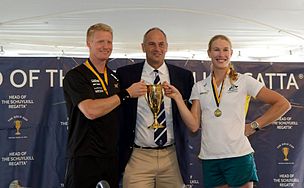
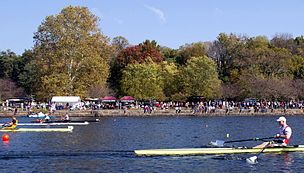
The Philadelphia Challenge Cup, known as "The Gold Cup", began during the heyday of Philadelphia rowing and pitted the best amateur male single scullers in the world against each other in a sprint race on the famed Schuylkill River.[28] In 1920, J. Elliot Newlin, the Commodore of the Schuylkill Navy and head of the Philadelphia Challenge Cup Committee, presented the Gold Cup to its first winner, John B. Kelly Sr. from Vesper Boat Club.[29]
The Gold Cup was originally created by a popular subscription of more than $2,500, and was to be to rowing what the Davis Cup is to tennis.[29] Its founding followed Mr. Kelly's winning the 1920 Olympics single sculls and the Henley Royal Regatta barring him from competing in the Diamond Challenge Sculls on the grounds he had been a brick layer, which meant he "wasn't a gentleman" and was therefore ineligible to compete as an amateur.[29]
| Year | Winner | Country | Ref. |
|---|---|---|---|
| 1920 | John B. Kelly Sr. | United States (Vesper) | [30] |
| 1922 | Walter M. Hoover | United States (Duluth Boat Club) | [30] |
| 1923 | W.E. Garrett Gilmore | United States (Bachelors) | [30] |
| 1924 | Paul V. Costello | United States (Vesper) | [30] |
| 1924 | Jack Beresford | England | [30] |
| 1925 | Jack Beresford | England | [30] |
| 1928 | H. R. Pearce | Australia | [30] |
| 1935 | Charles A. Campbell | Canada (Argonaut Rowing Club) | [30] |
| 1936 | Gustav Schaefer | Germany | [30] |
| 1940 | Joe Burk | United States (Penn AC) | [30] |
| 1948 | Mervyn Wood | Australia | [30] |
| 1950 | Mervyn Wood | Australia | [30] |
| 1952 | Yuriy Tyukalov | Soviet Union | [30] |
| 1956 | Vyacheslav Ivanov | Soviet Union | [30] |
| 1958 | Vyacheslav Ivanov | Soviet Union | [30] |
| 1960 | Vyacheslav Ivanov | Soviet Union | [30] |
| 1962 | Vyacheslav Ivanov | Soviet Union | [30] |
| 1964 | Vyacheslav Ivanov | Soviet Union | [30] |
| 1966 | Donald Spero | United States (NYAC) | [30] |
The Gold Cup mysteriously disappeared, ending the competition in the 1960s, only to reemerge in 2011 after a 50-year hiatus, with the expansion of the competition to women.[28][30] The race is held on a 750-meter course at the Head of the Schuylkill Regatta. In 2019, the Gold Cup became its own event, racing every year on the Cooper River.[30]
| Year | Men's winner | Country | Women's winner | Country | Ref. |
|---|---|---|---|---|---|
| 2011 | Iztok Čop | Slovenia | Miroslava Knapková | Czech Republic | [30] |
| 2014 | Kjetil Borch | Norway | Kim Brennan | Australia | [30] |
| 2015 | Kjetil Borch | Norway | Kim Brennan | Australia | |
| 2016 | Damir Martin | Croatia | Kim Brennan | Australia | |
| 2018 | Robbie Manson | New Zealand | Hannah Osborne | New Zealand |
References
[edit]- ^ a b Ferris, William R. (2004). The Greenwood Encyclopedia of American Regional Cultures: The Mid-Atlantic Region. Greenwood Publishing Group. p. 391. ISBN 9780313332661. Retrieved November 5, 2013.
- ^ "Head of the Schuylkill Regatta". Regatta Central. October 28, 2017. Retrieved November 3, 2017.
- ^ "Head of the Schuylkill Regatta History and Growth". Head of the Schuylkill Regatta. Archived from the original on November 9, 2013. Retrieved November 3, 2013.
- ^ a b Van Allen, Peter (January 2006). "36th Annual Thomas Eakins Head of the Schuylkill". Rowing News. 12 (11): 51. Retrieved November 5, 2013.
- ^ "Schulten and Müller Complete Fall Domination". Independent Rowing News. 1 (2): 8. November 6, 1994. Retrieved November 3, 2013.
- ^ O'Brien, Rick (July 8, 2010). "Philadelphia regatta series is established". The Philadelphia Inquirer. Philadelphia, PA: Philly.com. Retrieved November 7, 2013.
- ^ Saint Sing, Susan (2010). The Eight: A Season in the Tradition of Harvard Crew. New York, N.Y.: St. Martin's Press. p. 24. ISBN 9780312539238. Retrieved November 10, 2013.
- ^ Ujifusa, Steven B. "The Founding of the Head of the Schuylkill Regatta" (PDF). Graphica. p. 8. Archived from the original (PDF) on October 29, 2013. Retrieved November 3, 2013.
- ^ "Lyman Perry". SR/Olympic Sports. Archived from the original on April 18, 2020. Retrieved November 3, 2013.
- ^ Van Allen, Peter. "History of the Thomas Eakins Head of the Schuylkill Regatta" (PDF). Graphica. p. 9. Archived from the original (PDF) on November 9, 2013. Retrieved November 3, 2013.
- ^ Herzig, Allison. "Penn Glee Club to open Philadelphia's largest regatta". The Daily Pennsylvanian. Archived from the original on November 4, 2013. Retrieved November 3, 2013.
- ^ Blackwall, Christopher (December 21, 2003). "Watch Our Back". Rowing News. 10 (18): 12. Retrieved November 5, 2013.
- ^ "Course Map" (PDF). hosr.org. Archived from the original (PDF) on November 9, 2013. Retrieved November 8, 2013.
- ^ a b c d "Letter to the Editor". Rowing News. 2 (22): 4. November 1995. Retrieved November 13, 2013.
- ^ a b c d e f "Head of the Schuylkill Regatta". Regatta Central. October 27, 2013. Archived from the original on November 8, 2013. Retrieved November 7, 2013.
- ^ a b c d "Head of the Schuylkill Regatta". Regatta Central. October 25, 2003. Archived from the original on November 8, 2013. Retrieved November 7, 2013.
- ^ "Head of the Schuylkill Regatta". Regatta Central. October 28, 2012. Archived from the original on July 7, 2012. Retrieved November 7, 2013.
- ^ "Head of the Schuylkill Regatta". Regatta Central. October 26, 2002. Archived from the original on November 8, 2013. Retrieved November 7, 2013.
- ^ a b Winchester, Ed (November 8, 2001). "No Rest in Philly: Philadelphia's Head of the Schuylkill provides another fall racing opportunity". The Independent Rowing News. 8 (18). Chip Davis: 12. Retrieved November 3, 2013.
- ^ "Sponsorship Opportunities". hosr.org. Archived from the original on November 9, 2013. Retrieved November 8, 2013.
- ^ a b McManus, Tim (October 25, 2013). "Veteran pair tackles Head of the Schuylkill Regatta". The Philadelphia Inquirer. Philadelphia, PA: Philly.com. Retrieved November 8, 2013.
- ^ Narducci, Marc (October 27, 2012). "Olympic gold medalist Esther Lofgren in Head of the Schuylkill Regatta". The Philadelphia Inquirer. Philadelphia, PA: Philly.com. Retrieved November 8, 2013.
- ^ "41st Annual Head of the Schuylkill Regatta This Weekend Draws Over 5,800 Competitive Rowers". pitchengine.com. October 25, 2011. Archived from the original on November 9, 2013. Retrieved November 6, 2013.
- ^ "Results". Head of the Schuylkill Regatta. Archived from the original on November 9, 2013. Retrieved November 3, 2013.
- ^ "Head of the Schuylkill Results". Head of the Schuylkill Regatta. September 22, 2023. Retrieved September 22, 2023.
- ^ a b c "2013 Schedules and Results". hosr.org. Archived from the original on November 9, 2013. Retrieved November 6, 2013.
- ^ "2013 Head of the Schuylkill Regatta" (PDF). hosr.org. Retrieved November 6, 2013.[permanent dead link]
- ^ a b "Top International Rowers Compete For Historic Gold Cup Trophy". usrowing.org. September 9, 2014. Retrieved October 30, 2014.
- ^ a b c Burt, Nathaniel (1999). "The Schuylkill Navy". The Perennial Philadelphians: the anatomy of an American aristocracy. University of Pennsylvania Press. pp. 298–99. ISBN 978-0-8122-1693-6.
- ^ a b c d e f g h i j k l m n o p q r s t u v w "The Philadelphia Challenge Cup, from 1920 to 2014". row2k.com. Retrieved October 30, 2014.
External links
[edit]- Tim Furlong, Matt Morano, Mitch Budman, Lyman Perry (October 27, 2010). Head of Schuylkill Regatta (video). Philadelphia: nbcphiladelphia.com.
- Max Kaplan, Christopher Blackwell, Bruce La Londe (September 30, 2009). Rowing 101: A Guide to Rowing in Philly's Schuylkill Regatta (youtube video). Philadelphia: aroundphilly.com.







